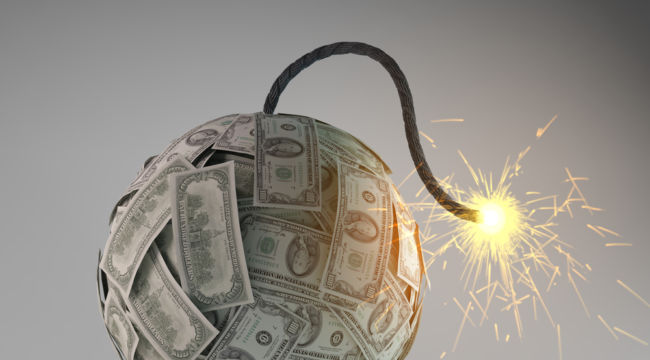REVEALED: Trump’s “Dollar Bomb”
China touched off the cannons yesterday… and had Wall Street in siege.
The Dow Jones plunged 767 points after China’s shock devaluation.
The S&P and Nasdaq were similarly pulverized — particularly the trade-sensitive Nasdaq.
Retaliation was swift…
For the first instance in 25 years, the United States Treasury branded China a “currency manipulator.”
“Currency manipulator” is no mere devil term.
It is the bureaucratic warrant for further sanctions.
Escalation will likely continue — eye for eye, tooth for tooth — until the sightless and toothless end.
Zero Hedge:
In the aftermath of the Chinese yuan devaluation, and the subsequent, and even more stunning, designation of China as a currency manipulator, one thing is clear: The first major currency war of the decade, if not the century, is now a fact.
But does President Trump hold a devastating currency war “secret weapon” up his shirtsleeve?
Can he use it to hammer the dollar lower?
But what could it be?
And can Congress, the courts — anybody — prevent him from using it?
Yesterday we put our agents on the case. This morning they reported their findings.
Details to follow.
But first a damage report…
Bomb-shocked investors came slinking from their bunkers this morning.
Among the rubble they ambled, assessing the damage.
Like Churchill during the Blitz, President Trump walked among them, projecting defiance… and shaking his fists at the enemy:
China has always used currency manipulation to steal our businesses and factories, hurt our jobs, depress our workers’ wages and harm our farmers’ prices. Not anymore!
Inspired, investors found their nerve today; and rallied to the colors.
The Dow Jones rose from the pits of despair with a 312-point gain.
The S&P gained 37 points. The Nasdaq responded with a 107-point spree of its own.
But what about the president’s secret currency war weapon?
He sobs endlessly that a strong dollar is sapping America’s “competitive edge.”
And he has pounded a tireless war drum against the Federal Reserve.
Yes, the Federal Reserve lowered interest rates last week. And it announced an immediate halt to quantitative tightening — previously scheduled to end in September.
But even if Mr. Powell and his goons lower rates again in September… will it shove the economy?
Do not expect it, says Deutsche Bank strategist Alan Ruskin:
“You need pretty large currency moves to have a meaningful impact on the economy.”
Pinprick 25-basis point trimmings are “just not large enough to have the kind of real economic effects that would be very helpful for the U.S. economy.”
And consider… after the Federal Reserve lowered rates last week, the Bloomberg dollar index jumped to two-month heights.
“Trump’s frustration with the currency market will continue to build,” argues one analyst at Amundi Pioneer Asset Management.
Adds Charles Dallara, former U.S. Treasury official and architect of the 1985 “Plaza Accord”:
“The trade debate will increasingly include the currency issues. It’s inevitable.”
If the Federal Reserve cannot work a meaningfully weaker dollar — what can?
Enter now the president’s secret Dollar Bomb…
Jim Rickards is perhaps the world’s recognized authority on currency wars. He — in fact — authored a 2011 book by that very title.
Mr. Rickards is so deeply linked to “currency wars”… he ought to take copyright on the term.
And according to him:
“If the White House and Treasury want a weaker dollar, they can achieve it on their own with no help from the Fed.”
But how?
“The Treasury is well-equipped to do this kind of intervention by using their Exchange Stabilization Fund, or ESF.”
The Exchange Stabilization Fund is the president’s secret currency war D-bomb.
The ESF commands some $100 billion. The Treasury Department can conscript these monies into national service, gird them for battle… and send them off into the currency markets.
There they can buy foreign currencies like euros, yen, francs, yuan, etc.
These purchases elevate the value of the currency being purchased. And since competing currencies function as seesaws… depress the dollar.
Here is the royal road to a cheaper dollar — if the president takes it.
But can he actually resort to the ESF without congressional or court say-so?
Yes… he can. Jim:
Importantly, the ESF exists completely outside of congressional control or oversight. It’s off-budget. It reports to nobody except the Treasury secretary and U.S. president. It is tantamount to a Treasury slush fund that the Treasury can use as it sees fit to intervene in foreign exchange markets. No legislation or congressional appropriation is required.
Our agents inform us Treasury Secretary Steve Mnuchin has been against it. And he has managed to keep Trump tethered to a leash.
But now that Treasury has labelled China a currency manipulator… perhaps he lets Trump run free.
Regards,
Brian Maher
Managing editor The Daily Reckoning



Comments: